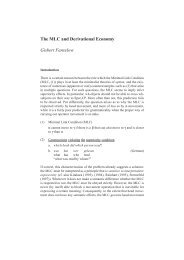Malagasy Adverbs Andrea Rackowski McGill University August 1996
Malagasy Adverbs Andrea Rackowski McGill University August 1996
Malagasy Adverbs Andrea Rackowski McGill University August 1996
Create successful ePaper yourself
Turn your PDF publications into a flip-book with our unique Google optimized e-Paper software.
In The Structure of <strong>Malagasy</strong>, Volume II , ed. Ileana Paul, UCLA Working Papers in Linguistics, 1998.<br />
"Not only does he not know his lessons, but he is talkative also."<br />
(23) Tsy mbola efa nahavita nisakafo Rakoto matetika amin'ny roa ora.<br />
Neg still already finish-pp eat-pst Rakoto usually at 2 o'clock<br />
"Rakoto has not eaten yet at 2 o'clock."<br />
The pre-verbal confusion intensifies with the following examples, in which tena,<br />
an intensifying adverb, intervenes between adverbs.<br />
(24) Tsy tena mbola mahay mandihay Rakoto.<br />
Neg Intensifier still know dance Rakoto<br />
"Rakoto really does not know how to dance yet."<br />
(25) Mbola tena tsy mahay mandihay Rakoto.<br />
"Rakoto still really does not know how to dance."<br />
4.4 Post-verbal <strong>Adverbs</strong><br />
The post-verbal adverbs may appear either after the entire VP (verb head and its<br />
complement) or between the verb head and the complement NP. When one or more<br />
adverbs appears between verb and complement, the complement must be definite.<br />
The post-verbal adverbs display many relative orders. They do not follow a very<br />
strict hierarchy, but one order does seem more natural than others. It is this order that<br />
follows.<br />
First after the verb is tsara, which means 'well'.<br />
(26) a. Manasa lamba tsara Rakoto.<br />
wash clothes well Rakoto<br />
b. Manasa tsara ny lamba Rakoto.<br />
wash well Art clothes Rakoto<br />
"Rakoto washes (the) clothes well."<br />
Tanteraka, meaning 'completely', is second.<br />
(27) a. Manasa lamba tanteraka Rakoto.<br />
wash clothes completely Rakoto<br />
b. Manasa tanteraka ny lamba Rakoto.<br />
wash completely Det. clothes Rakoto<br />
"Rakoto washes (the) clothes completely."<br />
(28) Manasa lamba tsara tanteraka Rakoto.<br />
"Rakoto completely washes clothes well."<br />
Next comes foana, meaning 'always'.<br />
(29) a. Manasa lamba foana Rakoto.<br />
b. Manasa foana ny lamba Rakoto.<br />
"Rakoto always washes clothes."<br />
(30) a. Manasa lamba tanteraka foana Rakoto.<br />
"Rakoto always completely washes clothes."<br />
b. *Manasa lamba foana tanteraka Rakoto.<br />
(31) a. Manasa lamba tsara foana Rakoto.<br />
"Rakoto always washes clothes well."<br />
b. *Manasa lamba foana tsara Rakoto.<br />
7
















